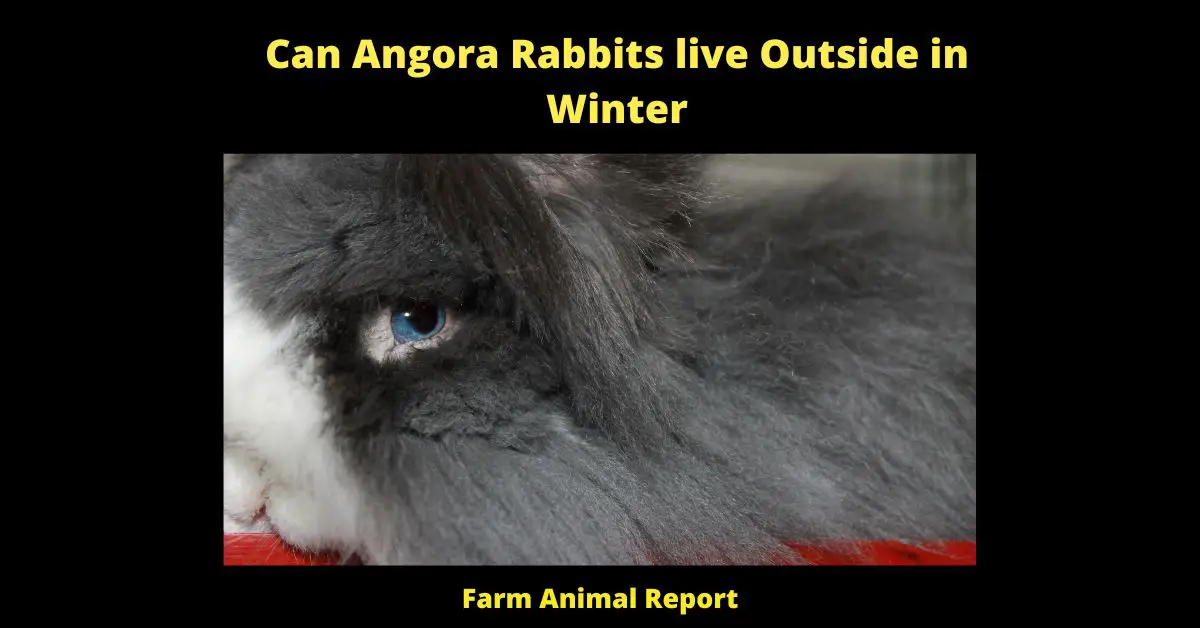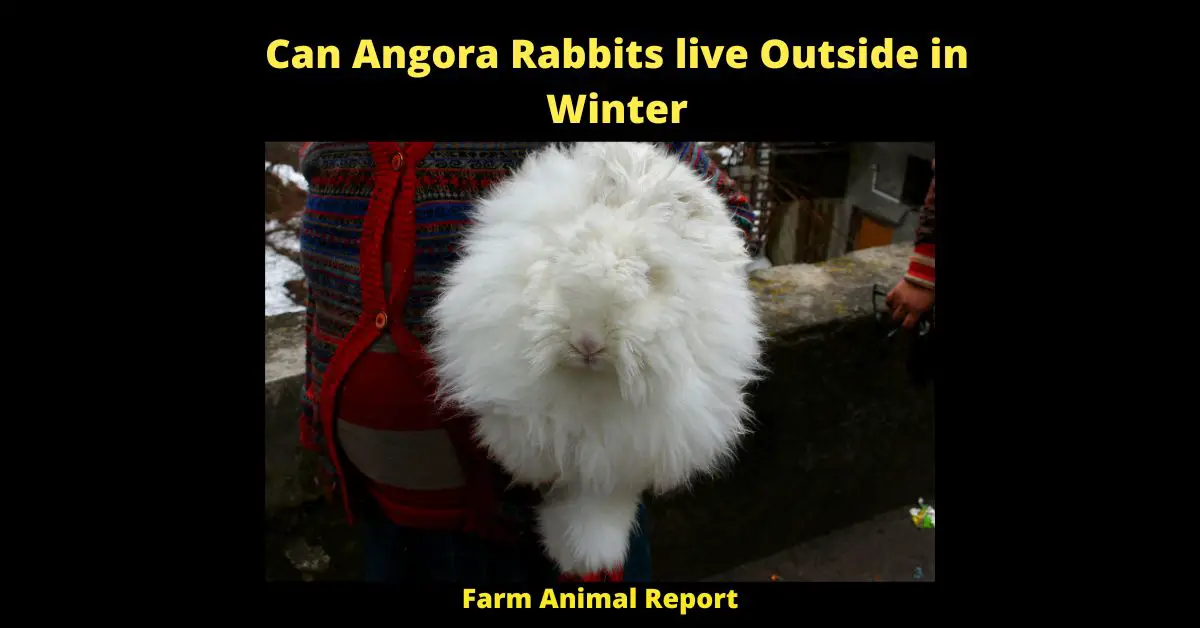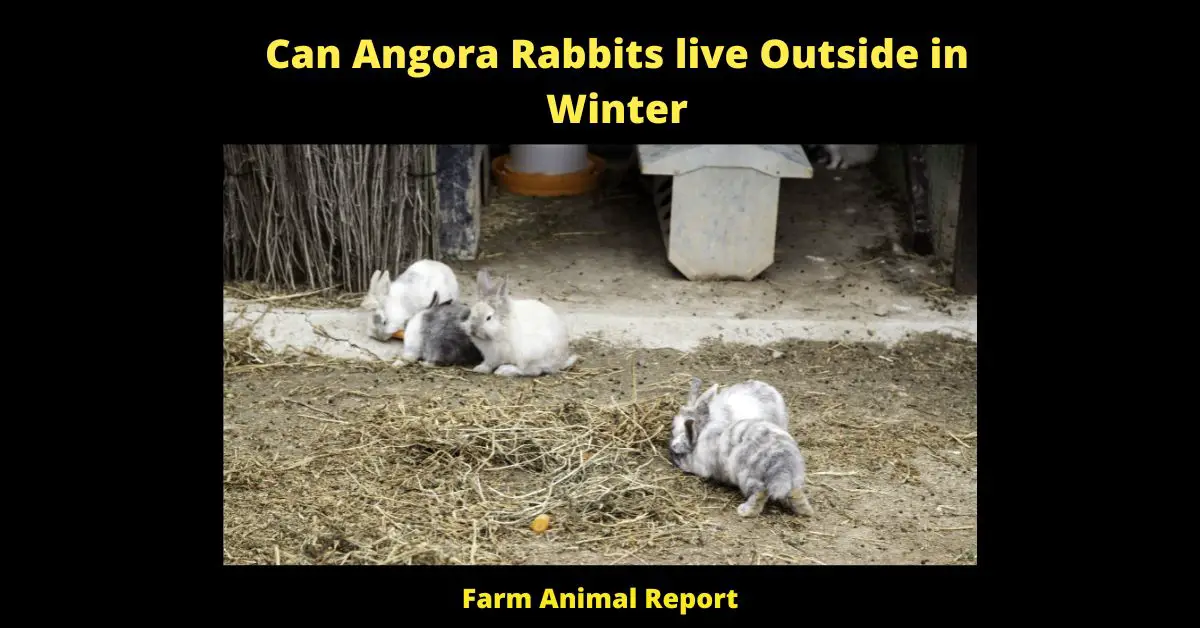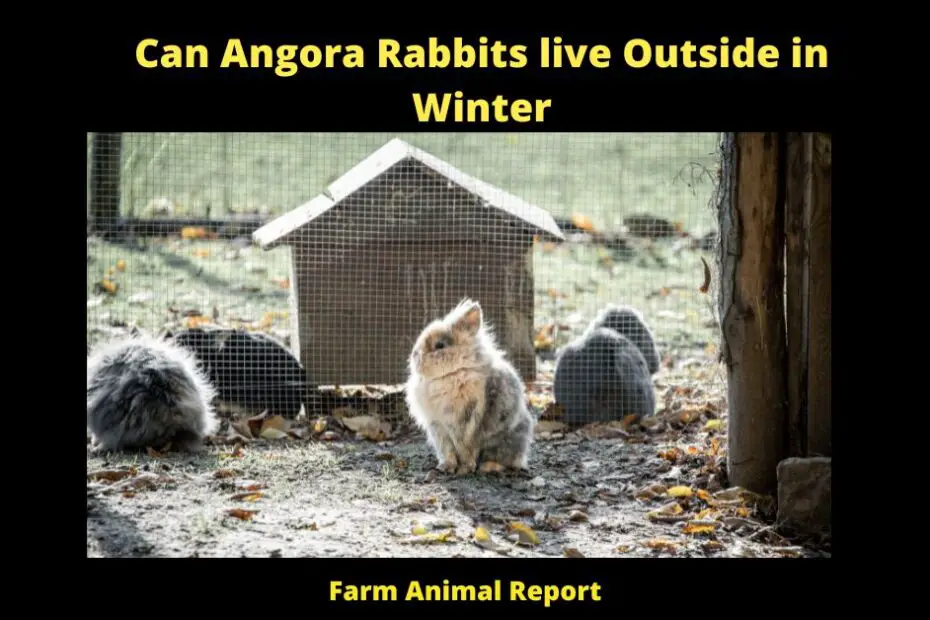Can Angora Rabbits live Outside in Winter – Angora rabbits are a popular breed of pet rabbit, known for their long, soft fur. While they make lovely companions, many people wonder if they can be kept outside in winter.
After all, their fur would seem to offer some protection against the cold weather. However, there are a few things to consider before letting your Angora rabbit outdoors in winter.
First, their fur can actually be a liability in cold weather, as it can become matted and frozen.
Second, Angora rabbits are not very active and may not move around enough to generate enough body heat to stay warm.
Finally, they are susceptible to respiratory infections, which can be fatal in cold weather. For these reasons, it is generally not recommended to keep Angora rabbits outdoors in winter. If you do choose to do so, take care to provide them with a warm, dry place to shelter and extra hay for bedding.
Can Angora Rabbits live Outside in Winter?
Should I keep my Angora Rabbit outside in the winter?
It’s a common question asked by many Angora Rabbit owners. With their fluffy coats, it’s no surprise that people want to keep their rabbits warm in the winter. However, there are both pros and cons to keeping your Angora Rabbit outside in the winter. In this blog post, we’ll explore the pros and cons so that you can make the best decision for your rabbit.
The Pros of Keeping Your Angora Rabbit Outside in the Winter:
1. Their coat is made for it- As we stated before, one of the main reasons people want to keep their Angora Rabbit outside is because of their coat. And rightfully so! Their coat is incredibly thick and insulating, making it perfect for cold weather. However, it’s important to remember that their coat will only keep them warm if it is healthy and free of mats. Be sure to regularly brush your rabbit’s fur to avoid any mats or knots.
2. They’ll have more space to roam– If you have a pet rabbit, chances are they’re cooped up inside most of the time. If you live in a cold climate, this means they spend a lot of time indoors during the winter months. However, if you do choose to keep your rabbit outside during the winter, they’ll have more space to explore. Just be sure their enclosure is secure so they can’t escape.
3. They may actually prefer it- While this isn’t true for allAngora Rabbits, some actually prefer being outside in the wintertime. This is especially true if they were born and raised outside. If you’re not sure if your rabbit would prefer being inside or out, try giving them some time outdoors in a secure enclosure on nice days and see how they respond.

The Cons of Keeping Your Angora Rabbit Outside in the Winter:
1. They’re still susceptible to predators- Just because your rabbit has a thick coat doesn’t mean they’re immune to predators. In fact, during the winter months, predators are often even hungrier and more desperate than usual due to a lack of food sources. If you live in an area with potential predators like coyotes, foxes, or hawks, it’s best to keep your rabbit indoors where they’ll be safe.
2. They can still get cold- Even though Angora Rabbits have thick coats, they can still get cold if they’re not properly taken care of. Be sure to give them plenty of bedding material like hay or straw to burrow into when they sleep and make sure their enclosure is well insulated against the cold air outside. A heating lamp can also be used to provide additional warmth if necessary.
3. A change in diet can cause health problems– If you choose to keep your rabbit outdoors during the winter months, their diet will likely need to change somewhat due to a lack of fresh greens available outdoors. Be sure to supplement their diet with hay and pellets so they’re getting all the nutrients they need and talk to your veterinarian about any other changes that should be made.
4. They may become anxious or stressed- Just like humans, rabbits can become anxious or stressed when facing new situations or environments. If you do choose to keep your rabbit outside during the winter months, be sure to monitor them closely for any signs of anxiety or stress such as excessive chewing on cage bars or fur-pulling. If you notice any changes in their behavior, it’s best to bring them back inside where they’ll be more comfortable.
5. They could develop respiratory problems– One of the biggest dangers of keeping your Angora Rabbit outside during the winter is that they could develop respiratory problems due to exposure to cold air. Be sure to watch for any signs of respiratory distress such as wheezing, sneezing, or excess mucus buildup around the nose and mouth. If you notice any of these symptoms, bring your rabbit inside immediately and contact your veterinarian.
5 Special Angora Fur Considerations for Angora Rabbits
Angora rabbits are a special breed of domesticated rabbit that is prized for its soft, fluffy fur. If you own an Angora rabbit, it is important to be aware of the special considerations that come with caring for their fur. In this blog post, we will discuss some of the most important considerations for angora fur care, including regular shearing, wool block, and elimination problems.
Regular Shearing
Angora rabbits need to be sheared every 3-4 months in order to prevent their fur from getting too long and tangled. If you are not comfortable doing this yourself, there are professional groomers who can do it for you. Be sure to take your rabbit to a groomer who is experienced in handling Angora rabbits, as their delicate fur can easily become tangled or matted if not handled correctly.
Wool Block
Wool block is a condition that can occur in Angora rabbits if their fur becomes too long and matted. Wool block can make it difficult for the rabbit to eat and drink, and can even lead to death if left untreated. If you notice your rabbit’s fur becoming matted or tangled, be sure to take them to a professional groomer as soon as possible.

Elimination Problems
Another common issue with Angora rabbits is elimination problems. This can happen when their fur gets too long and starts to impede their ability to urinate or defecate properly. Elimination problems can lead to serious health issues, so it is important to take your rabbit to a vet or groomer as soon as you notice any issues.
Does Kindling
Strangling Kits: Angora does (female rabbits) can sometimes get their kits (baby rabbits) tangled up in their long fur when they are nursing them. To prevent this from happening, you can purchase special ‘kindling kits’ that help keep the kits safe and warm while they are nursing. Alternatively, you can simply trim the does’ fur short before they give birth so that there is less of a chance for the kits to get tangled up.

Trimming Does for Milking:
If you plan on milking your does (milking angora rabbits is possible!), then you will need to trim their fur around their udders so that it doesn’t get in the way when you are milking them. Once again, consult with your veterinarian or groomer to determine how much fur needs to be trimmed and how often it should be done.
7 reasons Winter can Be Hard on Rabbits
- A sudden gust of cold wind can give them a cold, which can lead to pneumonia. Pneumonia is a serious respiratory infection that can be fatal for rabbits. Another reason why angora rabbits should not live outside in the winter is that they are prone to getting frostbite.
This is when their skin and tissue freeze from being exposed to too cold of temperatures. Frostbite is very painful and can cause permanent damage. The last reason why you shouldn’t put your angora rabbit outside in the winter is that its fur does not provide enough insulation from the cold. Even though they have fur, they are still susceptible to hypothermia, which is when your body temperature gets too low and can be fatal.
2. They can get frostbite. Keep Rabbit Hutch Warm
Rabbits are vulnerable to frostbite, which is when the skin and tissue freeze due to exposure to cold weather. Sign of frostbite includes pale or gray skin that feels firm or frozen. If you think your rabbit has frostbite, take them inside and put them in a warm room with plenty of bedding.
3. They are more likely to get sick in winter.
The colder weather can weaken a rabbit’s immune system, making them more likely to get sick. Watch for signs of illness such as weight loss, lethargy, diarrhea, and appetite changes, and contact your veterinarian if you suspect your rabbit is unwell.
4. Their food intake changes in winter.
Rabbits eat more hay in winter than they do in summer because hay helps them stay warm. Make sure you have plenty of hay available for your rabbit throughout the winter months.
5. They need more water in winter.
Frozen water bottles and troughs are a hazard for rabbits because they could crack their teeth if they try to drink from them. To prevent this, check your rabbit’s water several times a day to make sure it is thawed and fresh. You can also use a heated water bottle to keep their water from freezing solid overnight.

6. They huddle together for warmth.
Rabbits are social creatures and will huddle together for warmth when it’s cold outside. If you have more than one rabbit, they will groom each other which helps keep their fur coats clean and free of mats. But if you only have one rabbit, you will need to help them stay clean by brushing them regularly during the winter months.
7. They need exercise even when it’s cold outside..
Just because it’s cold outside doesn’t mean your rabbit should be cooped up inside all winter long. They still need time to exercise and stretch their legs, so be sure to provide them with an indoor play area where they can run around even when it’s too cold or snowy to go outside..
Winter can be hard on rabbits, but with a little bit of care from you, they will stay healthy and happy all season long!
Do Outdoor Rabbits Need a Litter Box
Space – One of the main considerations when deciding whether or not to provide your outdoor rabbit with a litter box is space. If you have a small yard or garden, there may not be enough room to set up a litter box without cramping your rabbit’s style. In this case, it may be best to forego the litter box and let your bunny do his business wherever he pleases. However, if you have a large yard with plenty of room to spare, setting up a litter box shouldn’t be an issue.
Summer – Another factor to consider is summer. When the weather is warm and the sun is out, your rabbit will probably want to spend more time outdoors than usual. This means he’ll have more opportunities to do his business in the great outdoors. unless you want your yard to turn into one big toilet, you may want to consider setting up a litter box during the summer months.
Winter – And finally, we come to winter. When the weather turns cold and icy, your rabbit will probably spend more time indoors where it’s nice and warm. This gives him fewer opportunities to do his business outside, which means he’s likely to use his litter box more often. For this reason, you may want to leave the litter box set up all winter long.
So, there you have it – everything you need to know about whether or not outdoor rabbits need a litter box. As you can see, there are pros and cons to both options.

Final Thoughts – Can Angora Rabbits live Outside in Winter
Overall, there are both pros and cons associated with keeping your Angora Rabbit outside during the winter months. However, ultimately, the best decision for your rabbit depends on several factors including climate, predators, and diet. Be sure to consult with your veterinarian before making any changes to your rabbit’s usual routine and always monitor them closely for any signs of illness or stress.
God Bless Greg





